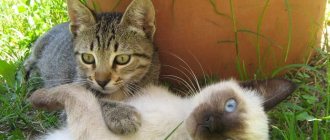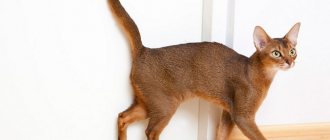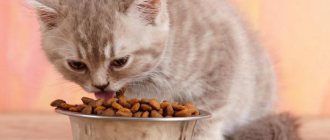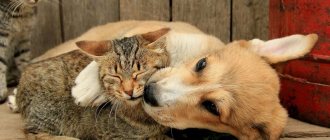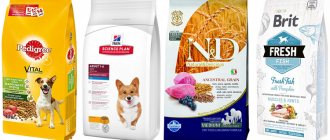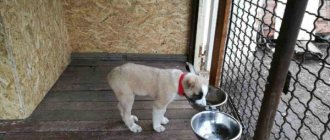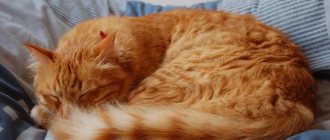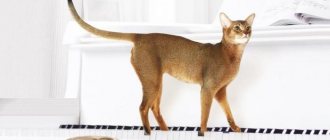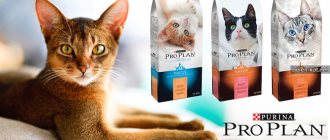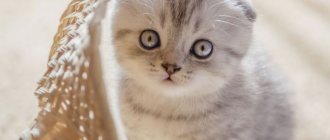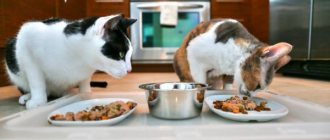The health and appearance, playfulness and life expectancy of a cat directly depend on how high-quality and balanced nutrition it receives. Owners of purebred cats and female cats especially need to carefully select the diet. When choosing a menu, you need to take into account the breed’s propensity for certain diseases of the digestive and other vital systems. The body of the Scottish cat, as well as other representatives of the cat world, is very similar to that of humans, which means that the animal’s nutrition must be correct, high-quality and healthy.
Nutritional features according to the physiology of Scottish cats
A cat is a predator by nature; therefore, the diet should be dominated by meat products with a high protein content. Proteins in the diet of a Scottish cat must be of animal origin.
Plant proteins are poorly absorbed by the body and are digested slowly. If they predominate on the menu, there is a high probability that serious diseases of the digestive system will occur. The amount of animal protein in the daily diet should be from 40% to 60% of the total food.
Fats are important for maintaining good health and activity of the animal. For cats, fats are a source of energy; their content in the diet should not be lower than 5%, and the recommended figure is 15% of the total amount of food per day. We are talking about fats of animal origin, since vegetable fat does not have any beneficial properties for the cat’s body.
Carbohydrates are an essential part of the Scottish cat's diet. However, they should be present there in limited quantities. Their daily volume should not exceed 12%. Containing more carbohydrates in a cat's menu will inevitably lead to diseases of the gastrointestinal tract, and the pancreas will be the first to suffer from them.
A balanced diet for Scottish cats includes the following ratio: 52% proteins, 12% carbohydrates and 36% animal fats.
Menu for an adult cat
As a kitten grows up, its needs and habits change. Each cat is individual and has its own character, so the diet and portion size must be calculated based on many factors. Try to adhere to a certain eating schedule. If the cat begins to actively beg for food, do not give in to provocations; it is better to reconsider the diet to increase the portion or calorie content. If you think the animal is getting enough, be firm.
Compliance with the regime promotes the formation of the habit of eating at the same time, disciplines, and has a positive effect on the gastrointestinal tract. Don't forget to keep the bowl and the area around it clean. Carefully monitor the quality of food and its freshness: everything that the cat has not eaten must be removed in a timely manner. Pay attention to your pet's behavior: the cat eats food made from natural meat more readily.
The peculiarity of purebred cats is that they are in dire need of protein food. Industrial feeds or homemade food have been developed for this. A serving can be approximately calculated as 50 g/1 kg of weight or 300 kcal. When choosing a portion, take into account the animal’s appetite: if the cat eats everything without leaving a trace and becomes full, then the amount of food has been selected correctly. After lunch, do not involve the cat in active games; pets love to have a quiet hour during the day.
What to choose – natural food or industrial feed
This question does not have a clear answer either among veterinarians or among owners of Scottish cats. Both types of diet have both advantages and disadvantages.
Eating from natural products is considered natural, and therefore more healthy. But only if all products are of high quality and properly prepared, the ratio of fats, proteins and carbohydrates is observed in ready-made dishes. When buying chicken, you cannot be sure of its quality, and there is also no guarantee that it does not contain antibiotics, and the meat has not been chemically treated for better and longer preservation.
The vitamins that cats need are found in vegetables. But how many representatives of the cat world will agree to consume them, and in such quantities as to replenish the required amount of vitamins and minerals for the body?
Natural feeding may not be entirely convenient for the owners themselves. Feeding a Scottish cat from a common table is strictly prohibited, and a working person may not have enough time to prepare a variety of dishes for his pet every day.
Then production rations come to the rescue - dry and wet food. The advantage of using industrial feed is that it contains a balanced content of proteins, carbohydrates and fats. These foods also contain all the minerals necessary for a Scottish cat.
But even here there are pitfalls. To make industrial food tasty, varied and healthy, you need to give preference to holistic and super-premium products. However, they are quite expensive, and not every pet owner can afford to buy them.
If a Scottish cat is on natural feeding, or its diet consists of inexpensive, and therefore not very high-quality industrial food, it needs to be regularly given vitamins and do not forget about a preventive examination by a veterinarian.
Ready-made food - a method of fast and balanced nutrition
Most cat owners spend a significant amount of time at work and are unable to prepare fresh food for their pets every day. In this situation, ready-made food , which can be bought at any supermarket, will be a real salvation.
As a rule, ready-made croquettes contain the required percentage of proteins, fats and carbohydrates. Also, ready-made food is filled with vitamins and minerals.
Feed goes on sale in several varieties:
- wet;
- dry;
- canned food
Any type of food requires the constant presence of a bowl of clean water next to the animal. The combination of different types of feed is permissible only if they are made by the same manufacturer. For example, in the morning an animal can eat a portion of dry food, and at lunchtime and in the evening canned or wet food.
What to feed the baby? It is better to purchase time-tested brands in the store. It is better to avoid cheap product options, as they do not contain the required amount of minerals and vitamins. In addition, such food can cause irreparable harm to the kitten’s health.
When choosing food for your pet, you should carefully study the composition and recommendations regarding age, breed and health status.
The best dry foods are:
- Hills;
- Royal Canin;
- Matisse;
- Advance;
- other super-premium foods.
Under no circumstances should you feed your Scottish Fold kitten the following foods:
- Whiskas;
- Kitiket;
- Darling.
You should gradually accustom your baby to food consisting of ready-made industrially produced food. During the first weeks, a small portion of such nutrition is introduced. This will prevent the occurrence of allergic reactions to the composition of the product. As a rule, in the first days it is recommended to give only 20% of the total recommended dose for a particular age.
Main features of feeding with prepared food
Kittens often play and run, thereby expending energy. That is why it is so important to provide your pet with proper nutrition, which will support muscle tissue and satisfy the baby’s energy needs.
The amount of food must correspond to the size characteristics of the pet. Each animal has an individual temperament, so the required calorie level is selected individually.
These serving size recommendations are usually based on kittens with an average activity level. This category includes animals that spend most of their time half asleep. Cocky purrs who mess up the house and run around the apartment all day need more nutrition. The serving size should be 40-50% more than recommended for their age.
It is worth considering the influence of weather conditions on the appetite of animals. On hot summer days, most cats refuse to eat, but in the cold winter they are ready to eat all day long. This is due to the large amount of energy that is lost when warming up. It is quite natural that these energy reserves must be fully restored.
The correct food intake for kittens consists of dividing the daily food intake into several meals depending on age (from 6 to 2 times). It is very important to follow the recommended amount of time between meals.
Despite the obligation to follow the recommendations of specialists regarding the nutritional system, you should first of all monitor your kitten. If he constantly demands a portion of new food, then he does not have enough of the volume that the owner offers.
Pet owners who spend a lot of time at work should take care to timely serve food to their pet. To do this, you will need to purchase a special dispenser that will dispense a preset portion volume at the appointed time.
Natural nutrition for Scottish cats
If you select high-quality products and combine them correctly in the daily menu, a natural diet will be very useful for the Scots. Every pet owner should clearly know which foods can be consumed and which are strictly prohibited, as they can cause various diseases.
Acceptable food set
In addition to the list of permitted products, you need to pay attention to how much and how often they can and should be given, as well as what are the features of their preparation:
- Meat should be given every day. The meat part should make up at least 50% of the total daily food volume, the ideal amount is 90%. Meat is suitable only for lean, low-fat varieties. The way to serve it is raw, but it must be frozen for 3 days. It is recommended to give it boiled only to Scottish kittens. For adults, boiled meat will not bring any benefit, since after heat treatment it loses all its beneficial properties.
- By-products - this includes chicken navels and liver, kidneys, beef liver, heart. There should be a lot of offal, like meat, in the diet, at least 70%. The heart contains substances such as taurine and amino acids - elements necessary for the normal functioning of the entire cat's body. Liver is useful, but quite heavy for cats; it can be given no more than 2 times a week. It is better to buy turkey liver; it is cleaner, unlike chicken or beef.
- Bones – Only chicken neck bones are suitable. It is recommended to give them to kittens to replenish the required amount of calcium in the body. They are passed through a meat grinder and served along with meat products.
- Fish is not the main product in the Scottish cat's diet. It can be introduced into the cat’s menu no earlier than 5 months. Recommended varieties: tuna, hake, sawfish, catfish. The fish is served only boiled, cut into small pieces, strictly without bones.
- Fermented milk and dairy products: essential ingredients in a Scotsman’s diet, but with some nuances in the daily menu:
- cottage cheese – low-fat, fresh, should be present in the kittens’ diet several times a week;
- cheese – only unsalted and minimal fat;
- kefir - can be given every day;
- Ryazhenka – can be consumed several times a week.
- Eggs – Scottish cats can only eat the yolk in chicken eggs. The egg can be eaten raw or boiled, but the egg should not be boiled for longer than 5 minutes.
- Vegetables – beets, carrots, zucchini, pumpkin and broccoli. Can be served fresh or boiled, or mixed with meat. If the cat does not want to eat raw vegetables, and when cooked they lose many of their beneficial properties, the best cooking option is to steam them a little.
- Greens – dill, parsley. They can be planted in small trays on the windowsill so that your pet can regularly enjoy a very healthy product.
- Oil – flaxseed, olive, rice, sea buckthorn – no more than 2-3 drops and no more than 2 times a week.
Sunflower oil does not provide any benefit to the body. Giving it to Scottish cats is highly discouraged.
Prohibited Products
Food products that should be absent from the diet of Scottish cats:
| Product | Why is it banned? |
| Sweets, confectionery | Provokes the development of diabetes mellitus. |
| Salty food | Diseases of the kidneys and bladder develop. |
| Chocolate | Absolute poison for the cat's body. |
| Coffee | Poisons the animal's body. |
| Milk | Causes disorders of the digestive system. |
| Smoked products | Poison for cats. |
| Fatty food | Disturbs the functioning of the pancreas. |
| Pork | It puts excessive stress on the organs of the gastrointestinal tract and causes pancreatic dysfunction. |
| Citrus | They dull the sense of smell and cause intestinal disorders. |
| Fruits | Eating fruit can cause prolonged diarrhea. |
| Mushrooms | Very heavy food has a toxic effect on the body. |
| Potato | Contains a large amount of starch, which is not digested or absorbed by the body. |
| Legumes | They provoke fermentation and create excessive stress on the animal’s digestive system. |
| Flour products | They do not contain any nutritional or beneficial properties and can cause obesity. |
Giving all these products to Scottish cats, even rarely and in very small quantities, is strictly prohibited.
Stern
Ready-made specialized feeds are divided into several types: dry and wet. Also, each type has a specific composition, based on the quality of which the food is classified into one of three categories:
- Economy;
- Premium;
- Super premium.
Economy feed is not feed in the truest sense of the word. Such food is acceptable as a one-time reward, but is not suitable for the daily menu. The composition of such feeds is unbalanced, and cheap fillers make such food not only unhealthful, but also harmful.
Your cat's diet should be balanced
When choosing ready-made food, it is advised to choose food in the medium and high price categories. Such a diet will provide your pet with all the necessary elements and also saturate it with the necessary calories.
If you are going to feed your cat several types of food at once, then such products should belong to the same line.
Most companies produce the same pet food in two different forms: wet and dry.
Brands recommended for the Scottish cat's diet:
- Royal Canin;
- Matisse;
- Advance;
- Hills;
- Purina Van.
Quality food
It is not recommended to give your Scottish cat cheap food brands:
- Whiskas;
- Darling;
- Kitiket.
Bad cat food
If it is necessary to transfer a cat from one type of food to another, the change of diet should be carried out gradually. If you decide to buy new food, do not buy a large amount at once, as the cat may become capricious and refuse the unfamiliar treat. It also happens that a new food causes an allergy in a cat, so first offer your pet a small amount of food.
Features of natural nutrition of Scottish kittens
Feeding a little Scot has its own characteristics. Every month, as your pet gets older, you need to add new foods to its diet. It is important to maintain the right combination of proteins, carbohydrates and fats. Proteins of animal origin must predominate to ensure normal development of the muscle corset.
Feeding a kitten from 1 to 2 months
The amount of food per day is up to 120 g. Raw lean meat is required; chicken or turkey are ideal. If a kitten grows up without mother's milk, the introduction of meat into the diet can begin at 3 weeks. It is ground using a meat grinder to obtain the consistency of minced meat.
From 1.5 months, meat can be cut into small pieces. Preference should be given to chicken, turkey and rabbit. It is not recommended to give beef, as it has wide fibers, and the kitten’s body cannot digest them normally. They also begin to introduce porridges boiled in a large amount of water to obtain a liquid consistency.
Diet at 2 and 3 months
The volume of food of an older kitten increases to 160-180 g per day. Meat is the basis of the diet, cut into cubes. The diet must include vegetables - they are boiled, chopped finely and mixed with meat. For Scots from 2 to 3 months, you can begin to accustom your kitten to commercial food, dry or wet.
Nutrition for a 3 and 4 month old baby
This age is characterized by the kitten’s active growth and muscle mass gain. In addition to cut-up meat and porridge with vegetables, the little Scotsman needs to be given store-bought vitamins that contain calcium.
If the Scotsman eats industrial feed, there is no need to give additional vitamins. But this only applies to those cases when the kitten consumes premium food and holistic products. Only these types of industrial feed can provide the animal with all the necessary mineral elements and vitamins that ensure normal development.
4-5 months
The volume of food gradually increases and is already 180-1240 g. The meat is cut into large pieces. The diet includes fish, but only low-fat varieties. You can give it only once a week, not more often. If fish is given to a cat once a month or less, and only as a treat, you can give preference to fattier varieties, for example, salmon. But it is permissible to pamper your baby with fatty fish extremely rarely and in very small pieces.
Diet from 5 to 9 months
Meals are provided up to 4 times; there should be no feeding at night. A Scot can already consume all permitted foods by this age. The basis is lean, raw meat and vegetables with cereals. It is recommended to gradually accustom the kitten to greenery. Giving him street grass is strictly prohibited.
If a cat shows interest in grass, it should be purchased at pet stores. It is sold in the form of grains, which are planted in the ground to germinate a healthy delicacy.
How to properly cook meat for Scottish cats
There is an opinion that giving raw meat to cats is strictly prohibited, because through it the pet can become infected with parasites. But there is also a theory that boiled meat is an unnatural product, because under natural conditions this product is consumed only in its raw form.
Raw meat can and should be given to the Scots. In boiled meat, after it has undergone heat treatment, all its beneficial properties disappear. Raw meat must be refrigerated for at least 3 days before giving it to your pet.
The low temperature in the freezer kills possible parasites, helminths and their eggs in the meat. However, if raw meat is present in the Scotsman’s diet, preventive helminthiasis must be carried out every 4 months.
Wet food
Wet food is often healthier for cats than dry formula. And all because they have a more balanced composition and contain a sufficient amount of liquid necessary for proper digestion. And it’s much more convenient to use dosed canned food and pates. And most importantly, cats always eat such a treat with great pleasure.
1
Grandorf
110 rub. (70 g)
When your pet reaches seven years of age, you should review its daily diet. After all, aging Scots are prone to obesity and the development of age-related diseases. For such animals, it is best to choose super-premium food with high nutritional value. Holistic supplements enriched with tocopherol, vitamin C and mineral complexes will be no less useful for your friend.
A selected delicacy for the most sophisticated gourmets. To produce its canned food, Grandorf uses exclusively the best types of meat - turkey, rabbit, fish and lamb. All these ingredients contain large amounts of valuable protein, minerals and fiber necessary for normal digestion.
10 /10
rating
pros
- Tender pieces in broth
- Natural meat based
- Easy to digest
- Cats eat with genuine appetite
- Combination of seafood and meat
- Absence of any chemicals
- Only selected ingredients
- Convenient packaging
Minuses
- No vegetables included
Grandorf cat food
2
Leonardo Quality Selection
130 rub.
(200 g) choice
Rating of the best toilets (trays) for cats in 2021 for those who keep furry pets in their home
Diet to normalize digestion. The German brand never ceases to delight representatives of the cat family with the release of ever newer, tasty and appetizing foods. Leonardo diets have long been famous for their nutritional value, quality and undeniable benefits. Gentle canned food is ideal for Scottish cats with digestive problems, gluten intolerance or allergies. However, in the line of this manufacturer you can also find many universal foods with different tastes.
9.6 /10
rating
pros
- 100% natural
- Based on natural meat
- Lots of useful supplements
- Wide range of flavors
- Suitable for allergy sufferers
- Gluten free
- Convenient release form
- Easy to digest
- Normalizes digestion
- Improves skin and coat condition
Minuses
- High price
Leonardo Quality Selection cat food
3
Bozita
200 rub.
(370 g) Universal food with good composition. In the Bozita line you can find a diet for every taste and need: for kittens and adult pets, aging and sterilized cats, with beef, lamb and even pork. But all these foods have one thing in common - consistently high quality and a rich composition, rich in a large number of nutrients.
Bozita canned food contains omega acids, vitamins, amino acids, and antioxidants. Overall, they have everything every pet needs to stay strong, healthy and energetic.
9.1 /10
rating
pros
- Acceptable cost
- Wide range of flavors
- Lots of vitamins and minerals
- Natural meat
- There is food for special cats
Minuses
- Inconvenient packaging
- Rarely found in stores
Bozita cat food
Industrial food
All industrial feeds are divided into three types: economy, premium and holistic. Economy class is considered cat fast food, they do not contain natural meat, they contain a lot of dyes, food additives and preservatives. Regular consumption of such foods (among them Whiskas, Kitiket) can provoke the development of serious diseases of the digestive system.
Preference should be given to premium or extra-premium and holistic specialists. They are not cheap, but they are absolutely natural and very useful. Industrial food recommended for representatives of the Scottish breed (on a mobile phone you can scroll the table horizontally with your finger):
| Name of food | Benefits and composition | Flaws |
| Acana Pacifica for Cats (dry) Holistics | Compound:
Contains cranberry, which has a beneficial effect on the genitourinary system and promotes normal digestion. All products are natural, there are no chemicals or antibiotics. Proteins, fats and carbohydrates are completely balanced. | High cost: 340 g cost 360 rubles or 180 UAH. |
| Primitive Feline Natural Cat Food Holistics | Components:
The composition contains over 30 microelements and vitamins. There are no flavorings or chemical components that enhance taste. The content of animal protein is within the recommended norm. | Difficulties with purchasing are not always available in pet stores. |
| 1st Choice Adult Cat Chicken Formula Super-premium | Compound:
The composition contains a fruit additive in the form of pineapple, which is enriched with a high content of vitamins and minerals. Normalizes the functioning of the digestive system and has a beneficial effect on the pancreas. The product has a high degree of saturation and is very economical in consumption. | There is cellulose - a low-quality filler that can provoke allergies. |
| Royal Canin British Shorthair Premium | Compound:
Among the components there is a high content of Omega-3 acids, which are necessary for the normal functioning of the heart muscle and circulatory system. The peculiarity of the food is its shape - it is curved, and the animal cannot swallow it whole. This food helps to thoroughly clean your cat’s teeth and mouth. | The food contains corn, which is a strong allergen. |
| Flatazor Crocktail Adult Poissons (suitable for Scots who love fish products) Premium | Compound:
The food is unique in that it contains an extract of the Yucca plant, which softens and significantly removes the smell of cat feces. The composition is enriched with essential mineral elements and vitamins. Animal fat content is 85%. | The food contains corn, which can cause an allergic reaction. |
Industrial feed for little Scots
It is strictly forbidden for kittens to be given food suitable for adults. For them, the developers of cat food produce specialized food, taking into account all the features and specifics of the growing body of a Scot (on a mobile phone, you can scroll the table horizontally with your finger):
| Name of food | Compound | What gives |
| Wahre Liebe Junge |
| Has a preventive effect to prevent urolithiasis, prevents hair from rolling and coming out. |
| Hill's Science Plan Kitten Tuna |
| Helps strengthen the immune system and prevent many diseases. |
| 1st Choice Kitten |
| A balanced diet, suitable for kittens with food allergies. |
| Royal Canin Kitten Instinctive |
| Helps strengthen the immune system; a balanced composition ensures the correct and harmonious development of the animal. |
| Royal Canin British Shorthair Kitten |
| Strengthens bone and muscle tissue, provides prophylaxis, preventing the occurrence of joint diseases. |
The best food for Scottish cats
Ready-made dry food is the best solution for modern busy owners who do not have time to prepare complete natural food. High-class industrial feeds: “premium”, “super premium”, “holistic” have a balanced formula enriched with vitamin and mineral complexes. They provide proper nutrition without additional feeding with vitamin preparations. Read more about feed classes.
According to veterinary standards, ready-made food must contain at least 26% protein (for lactating cats - 30%) and 9% fat. We have selected the best dry food for Scottish cats that meet these requirements:
- Acana Pacifica for Cats (Canada) – holistic food;
- Earthborn Holistic, Primitive Feline Natural Cat Food (USA) – holistic food;
- 1st Choice Adult Cat Chicken Formula (Canada) – super premium;
- Royal Canin British Shorthair (France) – premium class;
- Flatazor Crocktail Adulte Poissons (France) – premium class.
Acana Pacifica for Cats
Holistic grain-free food is produced in Canada. High protein content - 35% and fat - 19%.
Main ingredients: herring, salmon, salmon and herring flour, fish oil, potatoes. Fruits and vegetables: apple, carrots, pumpkin, peas, alfalfa, cranberries. Cranberry – regulates the acidity of urine, good for the genitourinary system. Chicory root has been added as a source of inulin.
The food is enriched with vitamins and minerals, medicinal plant extracts. The composition is completely natural, without chemical additives, flavor enhancers or flavorings. Used in Scottish catteries.
- Plus the food: balanced natural composition.
- Disadvantage of the food: high price.
Prices:
- 340 g – 500 rubles (240 UAH);
- 1.8 kg – 2199 rubles (1245 UAH);
- 5.45 kg – 4354 rubles (2025 UAH).
Buy on Zoopassage.
Earthborn Holistic, Primitive Feline Natural Cat Food
American-made dry food developed by nutritionists and veterinarians. High protein (44%) and fat (20%) content.
Main ingredients: chicken flour, egg powder, turkey flour, brown rice, herring flour, potatoes. Sources of fat: rapeseed oil, chicken fat. Fruits and vegetables: apple, carrots, cranberries, peas, spinach, blueberries.
The food is enriched with a vitamin-mineral complex of 30 elements. Does not contain flavorings, flavor enhancers or preservatives. Small fraction croquettes. Suitable for feeding cats during lactation.
- Plus feed: high content of natural protein.
- Disadvantage of food: it is not always available for free sale.
1st Choice Adult Cat Chicken Formula
High-quality Canadian-made food with a balanced ratio of protein (30%) and fat (17%).
Main ingredients: chicken meat, chicken egg, poultry flour, brown and brewer's rice, rice bran, flaxseed, beet pulp. Fats: fish oil, chicken fat, sunflower oil.
Tomato mixture and pineapple are used as fruit and vegetable additives in the food. Pineapple is a source of vitamins and minerals, stimulates intestinal activity, and has a beneficial effect on pancreatic function. The food contains vitamins and minerals.
- Plus the food: high nutritional value - the animal is satisfied with small portions.
- Disadvantage of the food: it contains cellulose - a cheap filler.
Royal Canin British Shorthair
French-made food developed for the British Shorthair breed - suitable food for Scottish cats.
Protein content – 34%, fat – 19%. Ingredients: dehydrated poultry, animal fat, rice, corn, yeast, chicory pulp, soybean oil. Crustacean shell hydrolyzate was added to the feed as a source of glucosamine. The source of chondroitin is cartilage hydrolysate.
Large kibble has a curved shape - the cat will not be able to swallow it. The food is enriched with Omega-3 fatty acids, EPA and DHA, which is beneficial for the cardiovascular system.
- Plus the food: the special shape and size of the food fractions clean the animal’s teeth and oral cavity.
- Disadvantage of the food: it contains corn, an allergen.
Prices:
- 400 g – 379 rubles (225 UAH);
- 2 kg – 1563 rubles (700 UAH);
- 4 kg – 2424 rubles (1212 UAH);
- 10 kg – 5446 rubles (2763 UAH);
- 13 kg – 6076 rubles (3235 UAH).
Buy food on Zoopassage.
Flatazor Crocktail Adulte Poissons
Premium French food for domestic adult Scots who prefer fish. Protein content – 31%, fat – 15%. The formula of the food with a reduced mineral content reduces the risk of urolithiasis.
Ingredients: dried poultry, dried fish, duck fat, wheat, corn fiber, apple, flaxseed, beet pulp, sea salt. Yucca Schidigera extract in the food reduces the smell of cat feces. The food is enriched with vitamins and minerals.
- Plus feed: high level of absorption of animal proteins (more than 85%).
- Minus of the food: it contains wheat and corn.
Nutrition of Scottish cats for various diseases
When a Scottish cat is sick, his diet, both natural and commercial, must be changed according to the nature of the illness.
Industrial feed
| Feed | Disease |
| Hill's Prescription Diet s/d | Stones in the kidneys. |
| Hill's Prescription Diet j/d | Joint diseases. |
| Hill's Prescription Diet z/d | Food allergies. |
| Hill's Prescription Diet Metabolic + Urinary | Obesity can be used to feed Scottish cats that have previously suffered from urolithiasis in order to prevent relapse. |
| ROYAL CANIN Skin Young Male | Skin diseases, hypersensitivity. |
Changes in natural feeding
Only a veterinarian can tell which foods should be excluded from the diet of a sick pet for various diseases, based on the characteristics of the clinical case. General recommendations for changing the diet of a sick cat are to avoid fish and foods high in salt.
What to feed Scottish fold and straight-eared cats and Scottish cats
Mixes are an alternative to monofeeding, when different types of meat are not mixed in one meal. Instead, they are served at different meals. This should not be confused with constantly feeding one type of meat: this is not considered a balanced diet. According to veterinarians, both mixes and monofeeding have a right to exist. The advantages of monofeeding are a happy pet, rapaciously devouring whole pieces of meat, as well as the confidence that the gastrointestinal tract will not be confused by incorrectly selected ingredients (for example, a cat may be allergic to one of the ingredients in the mix). The advantages of mixes are that the cat receives all the necessary nutrients in every meal and there is no need to draw up and keep in mind a feeding schedule.
We recommend storing excess meat in the freezer. It is advisable to pre-cut them into portioned pieces so that you can take them out one at a time.
Bran (controversial product)
Porridges are not a recommended food for carnivores, because... They are practically not absorbed and even interfere with the absorption of nutrients from other foods. With frequent consumption of grains (porridge), cats are at risk of diabetes, urolithiasis, and thyroid problems. It is better to prefer bran to porridge.
A cat can also get grains from special grass that is sprouted in a pot. The collections usually consist of wheat, barley, millet, etc. The grass is rich in vitamins and also helps the cat move the fur that has gotten into it through the gastrointestinal tract. If it is difficult to move it forward, then the cat vomits after the grass - and the fur comes out through the mouth. Therefore, every cat must have free access to grass. Just don’t bring it from the street: wild grass can contain parasites and infections.
Fish (optional)
Cats and fish are an established stereotype that has become the basis of more than one commercial. But, in fact, fish should not be a frequent guest on the cat’s table: once a week - no more. If there is an excess of fish food, kidney problems may develop, and the cat will also begin to prefer only fish products, neglecting healthier food.
Cats can only eat boiled sea fish; river and raw fish are prohibited. Firstly, such fish almost always contain parasites. Secondly, it contains a number of substances that negatively affect the digestibility of beneficial elements. Even those owners who allow the consumption of raw meat do not feed cats raw fish. Although there are some fans of a raw food diet who serve all products in an unprocessed form.
It is important to choose the right type of fish. It should not be overly oily. And it is worth considering that many types of fish (carp, pike, bream, whitefish, smelt, minnow, chub, catfish, gukuchan, ide, herring, herring, capelin, sardinella, smelt, crucian carp, perch, tench, burbot, chebak, sprat , sprat, anchovy, sorog, bream, Argentina) contain the enzyme thiaminase, which destroys vitamin B1. You can eat such fish, but not often. But you should not feed fish from the cod family, because it develops iron deficiency anemia and hair depigmentation. Salmon fish (salmon, pink salmon, trout), as well as hake, catfish, mackerel, sawfish, tuna, etc. are good for cats.
Seafood (as a treat)
Many cats happily eat squid, shrimp, mussels and rapana. Such food is not particularly easy for the cat’s body to digest, so it should not be the rule, but an exception in the form of a treat: once or twice a month is enough.
Dairy products (recommended product)
Low-fat fermented milk products (kefir, fermented baked milk, yogurt, unleavened cheese, whey, cottage cheese) are good for the health of cats: they contain a lot of protein, calcium and vitamins, and also help good digestion. It is undesirable to consume fatty dairy products, such as sour cream, in large quantities, because... this can negatively affect pancreatic health.
Let's talk separately about milk. It is not advisable to give it to adult cats. From about 3 months they develop lactose intolerance. If you want to please your pet, because... he loves this product, buy special milk or cream for cats. Read more about milk in the diet of Scottish cats.
Eggs (a must)
Chicken yolk, as well as quail yolk and white, should be a mandatory element of the Scottish cat’s diet approximately once a week. Chicken yolk should be given raw (if you are sure of its purity) or boiled; the protein is thrown away, because It's not good for cats. But a quail egg can be given whole and raw.
Raw eggs are an excellent source of vitamins (in particular, vitamins A, D, E and group B), as well as calcium, phosphorus, iodine, iron and other trace elements.
Vegetables (optional, but recommended)
Vegetables are also good for your pet: they contain fiber, which helps avoid constipation, and vitamins. B vitamins are especially important in vegetables; cats are very easily deficient in them, since they do not accumulate excess vitamins but excrete them daily. That is, B vitamins should be supplied in sufficient quantities every day. Veterinary expert Maria Dorosh recommends including vegetables in your cat’s diet, although this is not necessary.
Vegetables can be served raw or cooked. It is necessary to take into account that vitamins are destroyed during cooking, therefore, from the point of view of saturating the body with vitamins, it is better not to cook vegetables. But the starch of boiled vegetables is better absorbed, so cooking is recommended for cats who have problems digesting food: for them, boiled vegetables are a gentler option. Once your digestion returns to normal, you can switch to raw and lightly cooked vegetables. To make them easier to digest, they are added in small pinches and first grated.
Particularly useful are carrots (it is better to boil), beets (you need to boil, but this product can cause diarrhea and vomiting), cucumbers (give raw), zucchini (can be boiled and given raw), pumpkin, broccoli (lightly cooked), white cabbage (its , on the one hand, is not recommended because it causes flatulence, on the other hand, it is an excellent prebiotic, so you can periodically add a pinch of shredded cabbage).
Most often, cats refuse to eat vegetables separately, so you can mix them with meat and pour over meat broth to add flavor.
Greens (recommended product)
Cats benefit from parsley, dill, lettuce and other green foods. Sometimes cats eat them without anything. Sometimes they play with them and eat them as prey. Sometimes they are preferred instead of grass on the windowsill. Experiment.
Nutritional Supplements (Recommended Product)
You can add bran and meal (buckwheat, flaxseed, etc.) to the main diet. A pinch with food helps intestinal motility.
Dried kelp cleanses the body of toxins, helps to go to the toilet and enriches it with iodine. It is enough to periodically add a pinch to food.
Vegetable oils (hemp, sesame, sea buckthorn, olive, pumpkin, but not sunflower) deliver vitamins to the body and help digestion. But we repeat, they are practically not digestible, so it is better to prefer animal fats. However, many owners note positive changes in the coat when adding vegetable oils to the diet.
An important food supplement is fish oil (it contains fatty acids that are important for the cat’s body, including Omega-3 and Omega-6). You can purchase it as a supplement. Just keep in mind that fish oil quickly loses its beneficial properties after contact with air, so it is better to buy it in capsule form and open one at a time before adding it to food. However, cats that regularly consume fatty fish do not need a separate fish oil supplement.
Approximate diet for a Scottish Fold kitten up to one year?
It is recommended to feed kittens with super-premium food from such manufacturers as: Royal Canin, Acana, Orijen, Applaws, Schesir, Leonardo. Akana and Orijen are similar in composition and ingredients. Royal Canin contains more grains than Orijen or Acana, which have more protein.
When a kitten reaches 8 months of age or older, the following foods can be added to its diet: - special food (dry or wet) adapted to the cat's age, weight and health (for example, dermatological, liver, kidney and other diseases), - beef , chicken, fish (boneless, lightly cooked), - fermented milk products (cheese, yogurt), - cereals soaked in milk or broth, - rice, buckwheat or oatmeal, cooked in water or beef / chicken broth, - raw and boiled vegetables and fruits (raw carrots and apples; boiled cauliflower and green beans), - boiled egg or raw egg yolk (maximum twice a week).
List of prohibited foods for Scottish Fold cats: - pork, lamb, horse meat (meat, offal, bones), - fish or chicken bones, - sausages and sausages of any kind, - fried foods, sauces or any products containing sauce, - canned human food , - fermentable vegetables (potatoes, peas, beans), - preservatives (+ any types of food additives), - chocolate, hazelnuts, sweets in general, - freshly baked bread.
Features of the diet of Scottish Fold cats
When creating a diet for your lop-eared pet, keep in mind that feeding should occur in accordance with the schedule:
- small kittens (up to six months) are fed up to ten times a day;
- adolescents (after six months) - four times;
- adult cats (after one year) - no more than twice a day.
Of course, the serving size also depends on the age of the pet. A cat's diet should include:
- proteins (at least 26%);
- fats (at least 9%);
- carbohydrates (no more than 8%);
- minerals;
- vitamins.
To independently calculate a cat’s daily caloric needs, it is necessary to take into account the pet’s weight and lifestyle, so below are only approximate indicators that you can use as a guide:
- for a baby - 838 kJ (200 kcal);
- for a nursing Scottish woman - 1047.4 kJ (250 kcal);
- for a pregnant and developing household - 419 kJ (100 kcal);
- for an obese cat - 251.4 kJ (59.9 kcal);
- for an aging furry - 335.2 kJ (80 kcal).
Powerful and stocky Scottish cats experience increased stress on their joints compared to smaller cats.
What to consider when choosing a type of food
You can provide your pet with everything they need using one of three food options. The Scottish diet may consist of:
- natural products;
- prepared dry and wet food;
- combinations of prepared feeds and natural products.
The choice of food type is influenced by the following circumstances:
The owner’s capabilities and his degree of employment. It often takes much more time to prepare natural products than to use ready-made food. At the same time, store-bought premium and super-premium products have a fairly high price, and economy feeds are not suitable for Scots. Age. For example, kittens in the first month of life should eat their mother's milk. If for some reason this is not possible, infant formula is used as a substitute. After this, small portions of poultry or special wet food (pates, jellies, meat in sauce) are introduced into the kittens’ diet. All types of food are suitable for adult and healthy cats. The main thing is to try to balance the nutrients the animal regularly receives, taking into account the activity of the pet. Aging cats need smaller amounts of food because their sedentary lifestyle means they don't expend much energy. At the same time, due to pain in the gums, an elderly cat may refuse hard granules and tough beef meat. Choose wet food and soft natural foods. Animal reproductive function. Spayed and neutered pets are prone to obesity. Therefore, after the procedure, their portion sizes need to be reduced. The frequency of feeding is increased from two to three times a day. When choosing prepared feeds, preference is given to wet products. From natural products, it is better to use lean meat and broths cooked on it, as well as porridges, pureed vegetables and homemade greens. Scottish cats expecting a new baby will need special food for pregnant women. They are available in both dry and jelly form.
When feeding natural foods, it is important to provide your pet with calcium. For these purposes, the cat is regularly given low-fat cottage cheese, fermented baked milk or cheese. Animal health status
If your pet has digestive problems or is prone to certain diseases, then it is better to purchase special food. In this case, it will be problematic to independently calculate the balance of the diet, taking into account nutrients and microelements.
Video: Basic principles of feeding cats
What is prohibited in the diet of Scottish Fold cats?
When creating a diet for your pet, keep in mind that not all foods are healthy for a cat. Never give your pet food from your table. The most harmful to him are:
- fatty food;
- flour products;
- sweets;
- pork;
- smoked, salted, dried and spicy food;
- onion;
- garlic;
- potato;
- mushrooms;
- milk;
- canned food
All of the listed products, even after consumption in small quantities, can lead to health problems in a purebred fluffy.
What problems can arise from improper feeding?
Many foods not intended for cats cause increased gas and digestive upsets. In worst cases, symptoms of poisoning may appear. Sweets can lead to diabetes
Remember that Scots are prone to kidney and bladder diseases, so it is important not to give them salty foods, which provoke the development of these ailments. Excessively fatty foods negatively affect the functioning of the pancreas
Most diseases in cats can be prevented by simply providing them with the right food.
